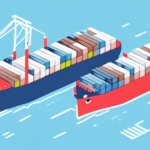Understanding International Shipping Rates for UPS Packages
If you have ever shipped a package internationally with UPS, you know that understanding the rates can be challenging. With numerous factors influencing shipping costs, it can be overwhelming to determine where to start. In this comprehensive guide, we will break down the various elements that affect international shipping rates for UPS packages. By the end, you'll have a clearer understanding of how to calculate your shipping costs and strategies to reduce them whenever possible.
How to Calculate UPS International Shipping Rates
The first step in understanding UPS international shipping rates is knowing how they are calculated. The cost of shipping a package internationally with UPS is determined by several factors:
- Weight and Dimensions: The size and weight of your package directly impact the shipping cost. UPS uses either dimensional weight or actual weight, whichever is greater, to calculate rates.
- Destination Country: Shipping rates vary significantly depending on the destination country due to differences in distance and customs regulations.
- Speed of Delivery: Faster delivery options, such as UPS Express, come at a higher cost compared to standard shipping services.
- Additional Services: Services like insurance, signature confirmation, and special handling can increase the overall shipping cost.
UPS offers various pricing options, including standard pricing and negotiated rates for customers with high-volume shipping needs. To calculate the cost of shipping a package internationally, you can utilize the UPS website's rate calculator or contact a UPS representative for a personalized quote. Keep in mind that quotes may vary based on fluctuations in any of the factors mentioned above.
Additionally, the type of item being shipped plays a crucial role in determining shipping costs. Certain items, such as hazardous materials or perishable goods, require special handling and packaging, which can increase shipping expenses. Properly classifying your item and ensuring compliance with all necessary regulations is essential to avoid additional fees or delivery delays.
Beyond shipping costs, it’s important to consider customs fees or taxes that may apply when shipping internationally. These fees are typically based on the value of the item and the destination country's regulations. UPS offers customs brokerage services to assist in navigating these fees and ensuring that your shipment complies with all required regulations.
UPS Shipping Zones and Their Impact on International Shipping Rates
Another critical factor affecting UPS international shipping rates is shipping zones. UPS divides the world into different shipping zones based on the destination country and the distance from the origin country. Generally, the farther a package must travel, the higher the shipping cost will be.
Understanding the shipping zones for your packages can help you predict shipping costs and choose the most cost-effective shipping options. UPS provides a tool on their website for calculating shipping zones based on the origin and destination countries of your packages.
It's important to note that shipping zones also affect delivery times. Packages traveling to farther zones may take longer to arrive compared to those traveling to closer zones due to extended transit routes and additional customs checkpoints. When selecting a shipping option for your international packages, consider both shipping costs and delivery times to ensure you meet your logistical needs.
Factors That Affect UPS International Shipping Rates
Several factors, beyond weight and distance, influence the cost of shipping a package internationally with UPS:
- Value of the Item: Higher-value items may incur higher shipping rates and require additional insurance.
- Contents of the Package: Certain contents, like electronics or fragile items, may require specialized packaging, increasing costs.
- Type of Packaging: Using premium packaging materials can enhance protection but may add to the shipping expense.
- Import/Export Taxes: Duties and taxes mandated by the destination country can affect the overall shipping cost.
- Delivery Speed: Faster shipping options typically cost more than standard delivery services.
- Customs Regulations: Countries with stricter customs regulations may impose additional fees or require extensive documentation, influencing shipping costs.
Taking all these factors into account is essential when calculating your shipping costs and preparing your packages. For instance, using appropriate packaging materials can prevent damage during transit and reduce the likelihood of incurring additional fees or charges.
Moreover, delivery speed is a significant factor influencing UPS international shipping rates. If you require your package to arrive promptly, you may need to opt for a higher shipping rate. Additionally, each destination country's customs regulations can impact the cost of shipping. Countries with stringent regulations may require additional documentation or inspections, leading to higher fees or longer processing times.
Tips for Reducing Your UPS International Shipping Costs
Frequent shippers with UPS can employ several strategies to reduce international shipping costs:
- Negotiate Rates: Engage with UPS to negotiate rates, especially if you have high-volume shipping needs. Volume discounts can significantly lower your per-package shipping cost.
- Consolidate Shipments: Grouping multiple packages into a single shipment can reduce the overall shipping expense. This approach leverages economies of scale and minimizes per-package costs.
- Utilize Third-Party Services: For personal shipments, consider using forwarding companies or consolidators to reduce costs. Ensure that these third-party services are reputable and reliable.
- Choose the Right Shipping Option: Assess the available UPS shipping services, such as air, ground, or ocean freight, to determine the most cost-effective option based on your package size, weight, and delivery timeline.
- Optimize Packaging: Using appropriately sized and sturdy packaging can prevent unnecessary dimensional weight charges and reduce the risk of damage.
- Take Advantage of UPS My Choice: This service allows you to customize delivery preferences, potentially avoiding additional fees for missed deliveries or address changes.
Implementing these strategies can lead to significant savings in your international shipping costs with UPS.
Understanding the Different Types of UPS International Shipping Services
UPS provides a range of international shipping services, each tailored to different needs and budgets. Understanding these services can help you select the most appropriate option for your shipments:
- UPS Standard: Cost-effective ground service for non-urgent shipments to Canada and Puerto Rico.
- UPS Worldwide Expedited: Faster delivery option for shipments that require delivery within 2-5 business days.
- UPS Worldwide Express: Urgent shipments that need to arrive by the end of the next business day to major destinations.
- UPS Worldwide Express Plus: Early morning deliveries, typically by 8:00 AM, to most destinations.
- UPS Worldwide Saver: Offers fast delivery times with guaranteed arrival by a certain time.
- UPS Freight: Suitable for large, heavy, or palletized shipments requiring freight services.
The type of service you choose will depend on your specific shipping needs, including budget constraints and required delivery speed. Additionally, different countries may have unique regulations regarding international shipping services. Research the specific requirements for your destination country to ensure compliance with all necessary regulations.
Another crucial aspect to consider when selecting an international shipping service is the level of tracking and visibility offered. Some UPS services provide real-time tracking and updates, while others may offer only basic tracking information. For high-value or time-sensitive shipments, opting for a service with more advanced tracking capabilities can provide peace of mind and enhance shipment security.
UPS also offers additional services such as customs brokerage and insurance. These services can streamline the shipping process by handling necessary paperwork and providing added protection for your shipment. Inquire about these options when selecting your international shipping service to ensure a smooth and protected delivery experience.
How to Package Your Items for Safe and Efficient UPS International Shipping
Proper packaging is paramount for ensuring the safety of your items during international transit and minimizing shipping costs. Here are key considerations for packaging your items for UPS international shipping:
- Use Sturdy Materials: Select packaging materials that can withstand the rigors of international travel. Use durable boxes and strong tape to secure the package properly.
- Protect Fragile Items: Cushion delicate items with padding materials like bubble wrap or foam inserts to prevent damage during transit.
- Secure the Contents: Ensure that all items within the package are tightly secured to minimize movement and reduce the risk of damage.
- Label Accurately: Clearly and accurately label your packages with both the sender's and recipient's information to avoid delays or issues with customs.
- Consider Weight and Size: UPS has specific weight and size restrictions for international shipments. Check the UPS packaging guidelines to ensure your package complies with these requirements. Exceeding size or weight limits may result in additional fees or shipment delays.
- Understand Destination Regulations: Research the destination country's regulations and restrictions on certain items, such as food, plants, or electronics. Complying with these regulations prevents customs issues and delivery delays.
Additionally, well-organized and appropriately sized packaging can help reduce dimensional weight charges, potentially lowering your shipping costs. Always ensure that your packaging is not only secure but also optimized for size and weight efficiency.
Navigating Customs Regulations When Shipping Internationally with UPS
Shipping internationally with UPS requires navigating various customs regulations, which vary by country. Here's how to ensure your shipments comply with these regulations:
- Research Destination Regulations: Each country has its own set of rules determining what can and cannot be shipped across borders. Familiarize yourself with these regulations to avoid shipping prohibited items.
- Provide Accurate Documentation: Accurate and complete documentation is crucial for smooth customs clearance. This typically includes a commercial invoice, packing list, and any necessary permits or certifications.
- Classify Your Goods Properly: Correctly classify the contents of your package according to the Harmonized System (HS) codes. Accurate classification ensures proper assessment of duties and taxes.
- Use UPS Brokerage Services: UPS offers customs brokerage services that handle the complexities of customs clearance on your behalf. Utilizing these services can expedite the clearance process and reduce the risk of errors.
It is important to note that certain items are prohibited or restricted from being shipped internationally, such as hazardous materials, firearms, and specific food products. Always verify with both UPS and the destination country's customs agency to ensure compliance with all regulations.
Additionally, providing complete and accurate documentation helps prevent delays and avoids incurring additional fees. Incorrect or incomplete documentation can result in your package being held at customs, delaying delivery and increasing shipping costs.
The Importance of Accurate Documentation for UPS International Shipments
Accurate documentation is essential when shipping internationally with UPS, as it ensures compliance with customs regulations and smooth delivery of your packages. Here's why accurate documentation is critical:
- Ensures Compliance: Providing the correct documentation ensures that your shipment complies with the destination country's import regulations, reducing the risk of shipment rejection or penalties.
- Facilitates Customs Clearance: Complete and accurate documents expedite the customs clearance process, minimizing delays and avoiding additional storage fees.
- Prevents Additional Fees: Inaccurate or incomplete documentation can result in fines, extra charges, or the need to pay duties and taxes unexpectedly.
- Supports Insurance Claims: In the event of loss or damage, accurate documentation is necessary to substantiate insurance claims and receive appropriate compensation.
To ensure your international shipments are processed efficiently, collaborate with your recipient to gather all necessary information and documentation in advance. This may include tax identification numbers, import licenses, and other required forms mandated by the destination country.
UPS offers various services to assist with international shipments, such as customs brokerage and compliance assistance. These services help verify that your documentation meets all requirements, reducing the risk of errors and ensuring a seamless shipping experience.
Tracking Your UPS International Shipment: What You Need to Know
Tracking your UPS international shipment is vital for monitoring the progress of your packages and ensuring timely delivery. UPS provides a robust tracking system that allows you to:
- Monitor Shipment Status: Receive real-time updates on the location and status of your package throughout the shipping process.
- Anticipate Delivery Times: Track estimated delivery dates and identify any potential delays early on.
- Identify Issues: Quickly detect and address any issues or delays that may arise during transit.
To track your UPS international shipment, use the UPS tracking tool available on their website or through the UPS mobile app. Enter your tracking number to access detailed information about your package's journey from origin to destination.
If you encounter any issues with your international shipment or require additional information, contacting a UPS representative can provide personalized assistance. UPS customer support can guide you through resolving any problems and ensuring your packages are delivered safely and efficiently.
In conclusion, understanding the factors that influence UPS international shipping rates is crucial for managing your shipping costs effectively. By considering the various elements that affect shipping rates, preparing accurate documentation, choosing the right shipping service, and leveraging UPS's tracking and support services, you can optimize your international shipping experience. With careful planning and attention to detail, your international shipments with UPS can be successful and hassle-free.



















